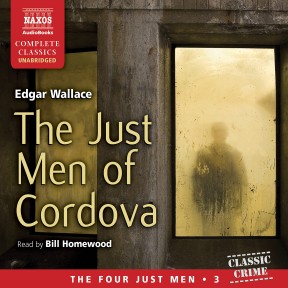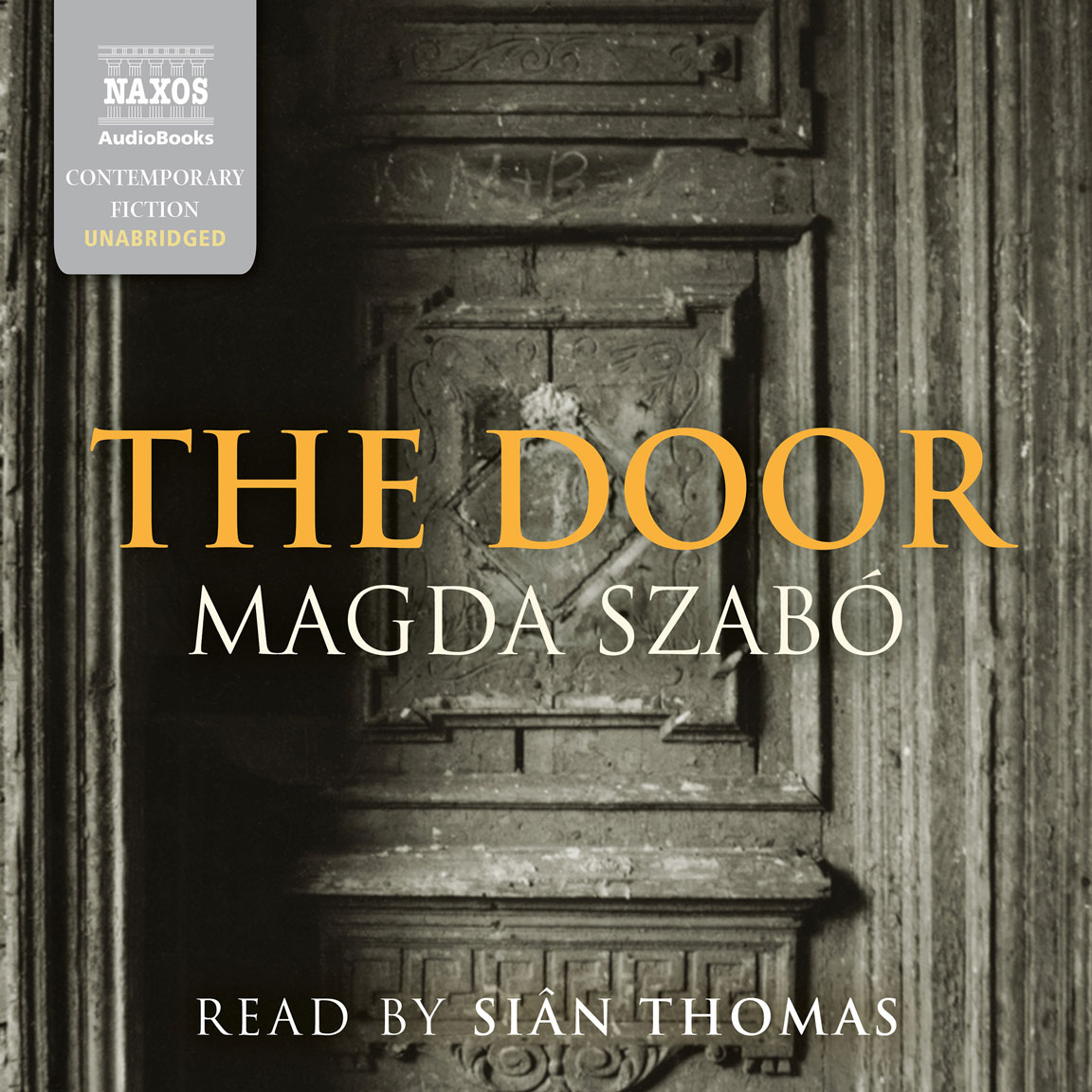
Audio Sample
Edgar Wallace
The Just Men of Cordova
Read by Bill Homewood
unabridged
The Four Just Men, dedicated to ridding the world of unpunished criminals and profiteers, take their campaign into the treacherous, aristocratic world of gambling, horse-racing and high finance, where blackmail, poison and murder are commonplace. Working outside the law, the Four take it upon themselves to clean things up in their own way.
-
Running Time: 5 h 54 m
More product details
Digital ISBN: 978-1-84379-524-7 Cat. no.: NA0060 Download size: 85 MB BISAC: FIC004000 Released: June 2012 -
Listen to this title at Audible.com↗Buy on CD at Downpour.com↗Listen to this title at the Naxos Spoken Word Library↗
Due to copyright, this title is not currently available in your region.
You May Also Enjoy
Booklet Notes
Most thrillers offer the reader an escape into a world where the pursuer of justice, often a detective, is a good person; his quarry a bad one. The stories may be more or less complicated (e.g. John Grisham’s novels), the subjects may be parochial (e.g. Agatha Christie’s novels) or they may involve international intrigue (e.g. Andy McNab’s novels), but on the whole the villain ultimately suffers the consequences of his actions, and justice triumphs.
In his Four Just Men series, Edgar Wallace comes up with something different: the ‘villains’ are not necessarily bad people, and the pursuers of justice, the Four Just Men, as they call themselves, are acting outside the law. They argue that their actions are for the public good and dispassionately eke the ultimate revenge – death – on their victims. In their turn, the Four Just Men are pursued by the police, but somehow remain our heroes, even garnering the reluctant praise of politicians:
‘It is a poetical idea,’ said the phlegmatic Premier, ‘and the standpoint of the Four is quite a logical one. Think of the enormous power for good or evil often vested in one man: a capitalist controlling the markets of the world, a speculator cornering cotton or wheat whilst mills stand idle and people starve, tyrants and despots with the destinies of nations between their thumb and finger – and then think of the four men, known to none; vague, shadowy figures stalking tragically through the world, condemning and executing the capitalist, the corner maker, the tyrant – evil forces all, and all beyond reach of the law. We have said of these people, such of us as are touched with mysticism, that God would judge them. Here are men arrogating to themselves the divine right of superior judgment. If we catch them they will end their lives unpicturesquely, in a matter-of-fact, commonplace manner in a little shed in Pentonville Gaol, and the world will never realise how great are the artists who perish.’
One does not have to look far in adventure films and literature to find glamorous heroes with questionable methods (for example Barry Eisler’s hit-man thrillers with titles like Blood from Blood and One Last Kill, Alexandre Dumas’s The Count of Monte Cristo, Johnston McCulley’s Zorro, innumerable war films of heroic and bloody retribution, and, of course, cowboy classics such as The Magnificent Seven). These appeal to the vigilante in all of us. Who has not dreamed of super revenge on a school bully, an unpleasant teacher, a traffic warden, a treacherous colleague? Perhaps, in 21st-century literature, the equivalent of The Four Just Men might be the action stories of our Special Forces heroes on so-called ‘deniable operations’, where we are led to believe that governments prefer to wash their hands of the illegal action – an abduction, an assassination – rather than admit to having ordered it. In such books we love the cautious, wicked methodology of killing – the plotting and creeping, even the dreadful moment itself. What is extraordinary is that we are following these events from the point of view of the assassin, who is honourable only because he is on government duty. It is great fun and possibly the best sort of holiday reading, to be vicariously criminal. We enjoy suspending the ordinary morality which we apply to our everyday lives in our schools, colleges and workplaces, and replacing it with this ‘naughty’ morality, where the end justifies the means.
George Manfred, Leon Gonsalez and Raymond Poiccart are wealthy Europeans who move easily in high society but, capable of convincing disguise and brilliant acting, are as likely to be found on the street corners of London as at the dinner tables of Paris and Rome. Like Dumas’s The Three Musketeers, they recruit a fourth person, and, by means of ingenious plotting and perfect timing, always a step ahead of the police, never fail in their task. They leave false trails and provocative notes, often teasingly pulling off extraordinarily complicated, even ritualistic, murders under the very noses of the police. It is probably the swagger and assurance with which the Four enact their crimes, rather than the justice of the punishment, which attracts our awe.
In The Just Men of Cordova, written in 1917, the Four move into the treacherous, aristocratic world of gambling, horse-racing and high finance. It seems that police services, even governments, have no power to control this world, where blackmail, poison and murder are commonplace. The Four, working outside the law, take it upon themselves to clean things up in their own way:
The doctor twisted his face nervously, then – ‘Have you ever heard of the Four Just Men?’ he asked…
‘Such an organization is known to exist,’ said Manfred, ‘and one knows that they do hap upon unpunished crime – and punish.’
‘Even to – killing?’
‘They even kill,’ said Manfred gravely.
We meet a number of shady characters who attract the interest of the Four, none more shady than a financier known as Colonel J. Black:
In this way did Black describe himself, though the Army list was innocent of his name… His face was thin and lank, his complexion sallow, with a curious uniform yellowness. If you saw Colonel Black once you would never forget him…
The reader is reluctantly drawn to sympathise with the Just Men’s cause, despite their methods. The book builds to a thrilling, surprising and satisfying denouement.
Edgar Wallace was born on 1 April 1875. His parents were unmarried actors. Nine days later he was adopted by a fish porter. At 11 years old he started his career selling newspapers on Ludgate Circus, London. After military service he became a journalist, working in South Africa and then London. He was a prolific and popular writer (despite Leon Trotsky’s assessment of his work: ‘It is hard to imagine anything more mediocre, contemptible and crude.’) At one time, Wallace’s publisher claimed that a quarter of all books read in England were written by Wallace. He lost a fortune on gambling and lavish entertainment. One particular decision was his ruin: a competition in the Daily Mail, which serialised The Four Just Men, in which readers had to solve the mystery. Too many were successful, and Wallace had to underwrite the prize money. He died penniless in 1931, while working on the screenplay of the Hollywood film King Kong. Today a memorial plaque in Ludgate Circus reads: ‘He knew wealth and poverty, yet had walked with Kings and kept his bearings. Of his talents he gave lavishly to authorship – but to Fleet Street he gave his heart.’
Notes by Bill Homewood




